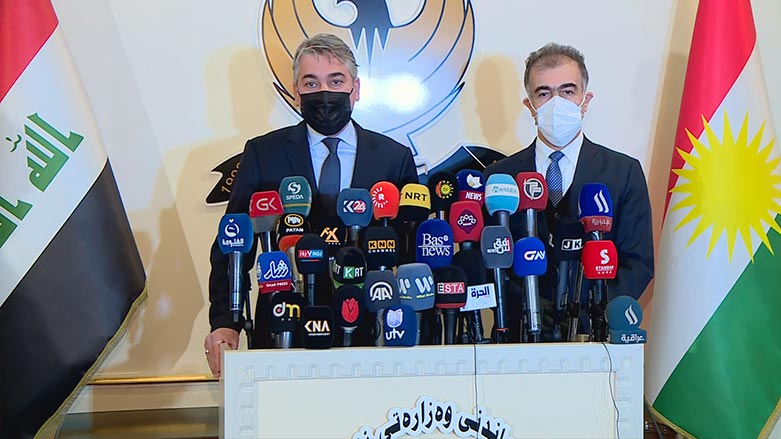‘KRG is ready to facilitate the voluntary return of migrants to the region’: official
“One of the reasons the youth emigrated from the Kurdistan Region is the presence of the PKK.”

ERBIL (Kurdistan Region) – The Kurdistan Region’s Minister of Interior met with all relevant government offices on Wednesday to discuss the Kurdish migrant issue on the Belarus-Polish border and find suitable solutions for it.
“Migration is a natural phenomenon that happens in the Middle East and African regions, and the Kurdistan Region is part of it,” Kurdistan Regional Government (KRG) spokesperson Jotiar Adil told a joint press conference with Safeen Dizaye following the meeting.
“However, the Kurdistan Region is much better than the neighboring countries in this regard, and the migration percentages have decreased comparing to previous years.”
Read More: Poland blocks migrants at Belarus border, warns of 'armed' escalation
Adil stated that there are a number of factors, including economic and security, causing the migration from the region and that the KRG has discussed and studied these factors.

“The KRG is very serious about solving this problem, and the recommendations made in today’s meeting will later be raised with the KRG Council of Ministers,” he said.
“The KRG has been working hard to create job opportunities and implement reforms, and in the past two years, the KRG has been able to create more than 120,000 job opportunities,” Adil added.
Read More: Violence used against migrants on Belarus' border with Lithuania, Poland: K24 source
He also said that other reasons behind the migration include the slashing of the Kurdistan Region’s budget by the Iraqi government in Baghdad.
“This issue has been politicized and used by some sides against the KRG to gain the sympathy of people,” he said.
In the same conference, Safeen Dizayee, the head of the KRG Department of Foreign Relations (DFR), said that Iraq used to have regular flights to Belarus and Iraqis could visit that Eastern European country with tourism visas.

“But then, under EU pressure, Iraq stopped these flights,” Dizayee said. “However, migrants found other ways through Lebanon, Syria, and Turkey to continue migrating to Belarus.”
Read More: Fifth Iraqi refugee in one week dies on border of Poland and Belarus
“The migrants are going toward an unknown destiny, and the photos we see from the borders of Belarus, Poland, Lithuania and Latvia are catastrophic,” he added. “The migrants are not only Kurds from the region, but include people from the rest of Iraq, neighboring countries, and Afghanistan.”
Dizayee revealed that the KRG, under the instruction of Kurdistan Region Prime Minister Masrour Barzani, has been in regular contact with the Polish consulate in Erbil.
“But unfortunately, because we don’t have representation in Belarus and Iraq doesn’t have an embassy in Belarus, it is difficult to follow up with them on this case,” he said.
“As you know today, there are political problems between Belarus and the EU, and those people on the border are the victim of these political problems,” he added. “We call on our people not to put their destiny in the hands of human traffickers. As we see in the photos, the families are facing an unknown destiny in the cold weather, and there have even been two Kurdish deaths so far.”
Dizayee revealed that KRG has talked with the Lithuanian foreign minister recently and that Lithuania has asked the KRG to cooperate with the Iraqi federal government to help facilitate the return of migrants.
Read More: Iraqi woman dies near Poland-Belarus border
“The Lithuanian authorities promised to facilitate the return of the migrants,” he said. “However, we are not for their forcible return.”
“The Iraqi federal government has formed a special committee to address these issues, and officials from the KRG are included in this committee,” he added. “The Iraqi government has allocated 300,000 Iraqi dinars for this purpose.”
Dizayee blamed the Kurdistan Workers’ Party (PKK) for the migration of youths from certain areas “because their villages have been burned because of the fighting between the PKK and the Turkish Army.”
He said regions such as Garmiyan, Qandil, and Raparin haven’t had any investment in them because of the continued PKK presence.
“We decided to alert people about the dangers they would face if they go there (Europe) through human traffickers, who have told people that they would take their families from here to Germany for $15,000 only to then leave them halfway through their journey,” Dizayee said.
“There are people who encourage migration on social media.”

He reemphasized that the Kurdistan Region is “ready to facilitate the return of those who voluntarily want to return to the region.”
“We don’t pressure any one to come back against their will,” he said. “We call the EU to provide humanitarian support to the migrants temporarily until the problem is solved.”
